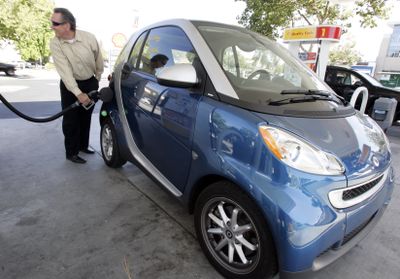Consumers’ frugal habits sticking despite oil’s dip

Public transportation is in. Hummers are out. Frugality is in. Wastefulness is out.
The worst oil shock since the 1970s has put a permanent mark on the American way of life that even a drop in oil’s price below $100 a barrel won’t erase.
Although oil prices dipped beneath the $100 mark Friday for the first time in five months, it still isn’t cheap and Americans have long memories. They are saddled with debt, high food costs and home prices worth far less than two years ago.
Experts say some relief at the pump is probably coming within weeks after light, sweet crude fell to $99.99 before closing later at $101.18, up 31 cents. But the era of “staycations,” four-day work weeks, airline fuel surcharges and costly commutes could be here to stay.
One immediate reason is Hurricane Ike, which steamed into the Gulf of Mexico on Friday and forced a cluster of refineries to shut down, sending wholesale gas prices spiking. Also, refineries are still saddled with more expensive fuel and having trouble selling it as people drive less. As cheaper oil begins trickling into refineries, pump prices should start to ease some, possibly by October. “We’re not going back to $2-a-gallon gasoline,” said Stephen Schork, an analyst and energy trader in Villanova, Pa. “Consumers have to appreciate that the low prices we had before didn’t reflect the price of crude, so there will be a limit to how much prices will come down.”
More bad news: Food prices, plane tickets and plastic goods made from petrochemical products aren’t expected to get much cheaper, either. The softening U.S. economy means food makers, airlines and manufacturers are unlikely to roll back recent price increases for goods and services anytime soon.
Although the hurricane is keeping gas prices high, it’s not doing the same for oil, as it has in the past. Neither are geopolitical flare-ups involving Russia and Venezuela. Many analysts say that’s because speculative investors – not rising demand – pushed oil prices to record levels this summer. “This market is clearly telling us that it was priced too high,” said Peter Beutel, an analyst at Cameron Hanover in New Canaan, Conn., who believes oil will fall to $70 to $80 a barrel.
As prices come falling back to earth, Americans aren’t expected to drop their newfound frugality. The reality of $4-a-gallon gasoline stirred up consumer angst that experts say will keep people from reverting to extravagant energy use for years – if ever. “I see a permanent shift,” said Kit Yarrow, a consumer psychologist at San Francisco’s Golden Gate University who has studied how high oil prices have affected Americans’ buying behavior. “Historically, when gas prices come down, people use more. But we’ve learned a lot of new things during this period and it will be hard to go back to our gas-guzzling ways.”